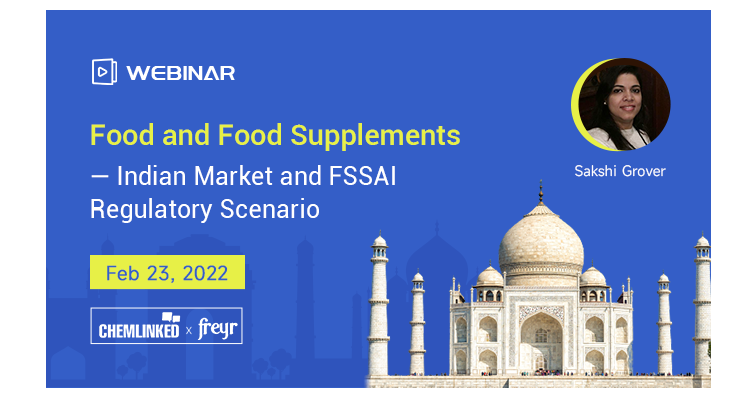Sakshi Grover: The Indian food processing market reached a value of approximately $555 Bn in 2020 and is poised to rise at a CAGR of 12% during 2021-2026. The market's largest segment is the segment Bread & Cereal Products, and major imports of India include cereals, and edible oils. On the other hand, India is leading in the nutraceutical market; the nutraceuticals market in India can be further divided into functional food, beverages, and dietary supplements. While functional food includes items such as breakfast cereals and fortified flour, functional beverages include commodities like sports drinks, fortified juices, and glucose. Dietary supplements, which constitute over 65 percent of the Indian nutraceuticals market, include commodities such as macronutrients, herbal, and non-herbal extracts. This segment that draws major competition and is the home ground to firms like Amway, Himalaya, Dabur, and Emami. This segment is growing at a rate of 17 percent, and hence, will drive the growth of the market.
The Indian Dietary Supplement Market was valued at USD 3924.44 Million in FY2020 and is predicted to grow at a CAGR of 17.28% until FY2026, to reach USD 10,198.57 Million by FY2026.
Sakshi Grover: The competent authority for food regulations in India is FSSAI.
FSSAI is India's Food Safety and Standards Authority- an autonomous body established under the Ministry of Health & Family Welfare by the Government of India. The function of FSSAI is to protect and promote public health by regulating and supervising food safety. The foremost responsibility of FSSAI, includes the development of Science-based Food Standards for articles of food and food products and regulating their manufacture, storage, distribution, sale, and import to ensure the availability of safe and wholesome food for human consumption.
The main functions of FSSAI are:
Framing regulations with every single category of food product.
Accreditation of certified bodies who are engaged in certification of food safety management system.
Laying down procedure and guidelines for accreditation of laboratories.
Scientific advice and technical support to Government for food safety and nutrition.
Collect and collate data on food consumption on risk management in terms of biological risks, contaminants in food, Food adulteration with a view of the introduction of a rapid alert system.
Development of international technical standards for food, sanitary and phyto-sanitary standards.
Training programs, Certification programs of Food Safety/ hygiene practices, and promoting general awareness about food safety and food standards.
Additionally, for certain product categories, compliance to rules/guidelines laid down by other bodies such as the Bureau of Indian Standards, Plant Quarantine department, and animal quarantine department should also be looked into.
Sakshi Grover: The product composition in terms of the ingredients used, additives, and their limits should be compliant with the standards laid down by FSSAI for that category. The label should be compliant with the labeling regulations. For claims, if any, should be as per the new regulations that have been laid down.
Furthermore, companies should have an importer with a valid FSSAI license and DGFT code for import and export.
Sakshi Grover: Despite being transparent in food supplements regulation, Nutraceuticals/Dietary Supplements face numerous global Regulatory procedural challenges, especially in markets like India, where food classification into a specific category is of utmost importance, as food supplements in India are classified into eight (08) different categories, and each category has its own set of accepted and prohibited ingredients and claims. However, it should be noted that since India is a compliance-driven market, if the product is compliant with the standards laid down, then the product can be imported into India. The critical requirement here is to have an importer with a valid FSSAI license for import.
Webinar Recommendation
For more information about Indian food regulations, welcome to join the ChemLinked webinar coming on Feb. 23, 2022, which will provide a complete regulatory outlook on how food products and food supplements are regulated in India along with the end-to-end steps in launching the food/food supplements in India.
About the Expert
Sakshi Grover Manager, Strategic Services Sakshi Grover is a Regulatory Professional with ten (10) years of experience in the Food and Nutraceuticals Industry. Sakshi, a food scientist by profession, has worked with the Indian Food regulators – Food Safety and Standards Authority of India for four (4) years. For the last six (6) years, she has been working for the food industry in regulatory compliance and launching products in global markets. Her core set of competencies includes Regulatory strategy and solutions, Regulatory support for global projects, Product Compliance, and Compliance audits for the Food and Nutraceuticals industry. |






 We provide full-scale global food market entry services (including product registration, ingredient review, regulatory consultation, customized training, market research, branding strategy). Please contact us to discuss how we can help you by
We provide full-scale global food market entry services (including product registration, ingredient review, regulatory consultation, customized training, market research, branding strategy). Please contact us to discuss how we can help you by 









